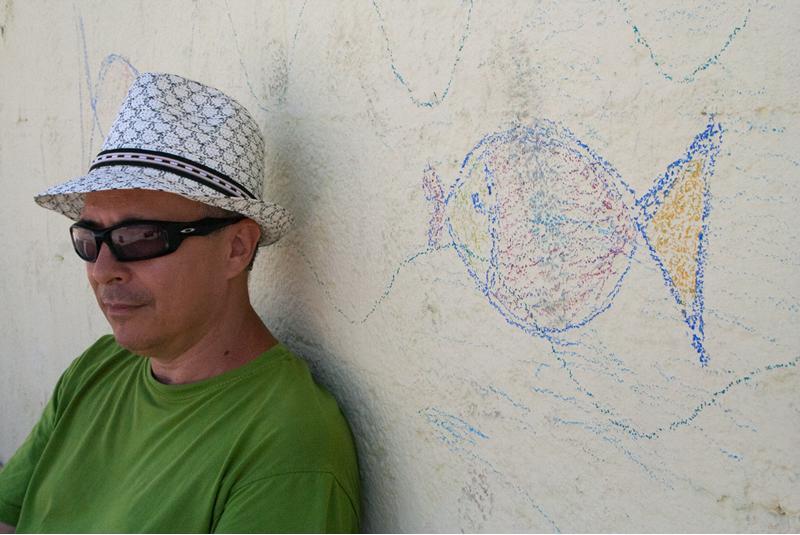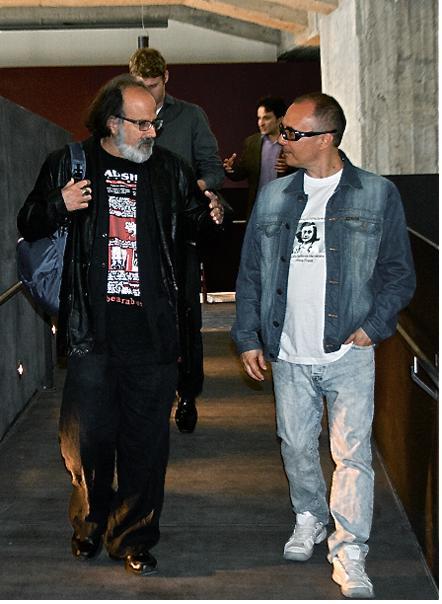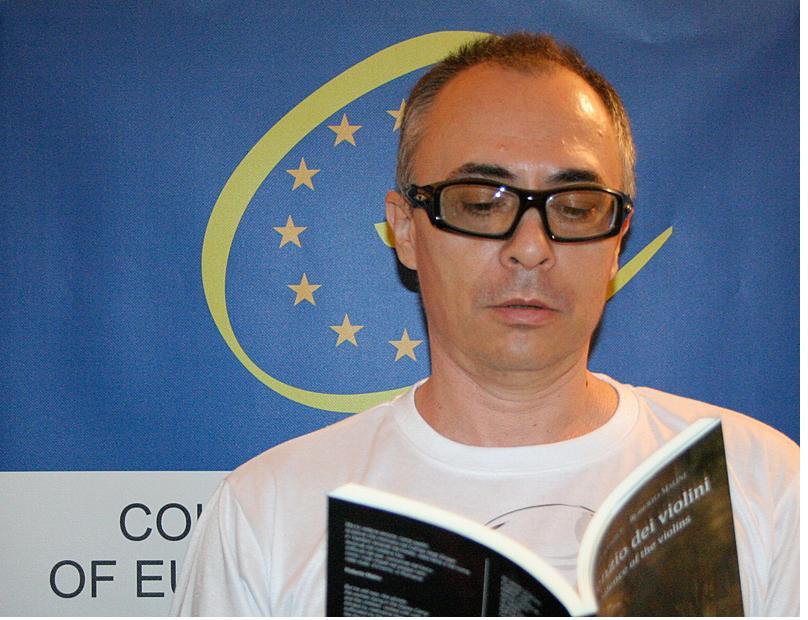Roberto Malini was born in Milan on May 27th, 1959. Poet, artist, historian, screenplay writer and documentary maker, he is co-president of EveryOne Group, an international human rights organization. He wrote his first poems back in 1972 encouraged by his mentor, the philosopher Fulvio Papi. In 1975 he wrote the short novel in verse, L’uovo, from which the director Dario Picciau made the 3D animation film of the same name. The film won many awards at international film festivals. Malini has contributed works to the literary journal Nuovi Argomenti, and published the collections ”Il maestro delle danze divine”, ”La legge del volo” and ”Belante cosmo”. In the 1980s he gave a series of performances of poetry and music in the major Italian cities. He led a group of poets involved in fighting discrimination – including Dario Bellezza, Christopher White and Paola Astuni – which led to several readings throughout Italy. “Poetry must come out of the literary salons” he said at one of the meetings, “we must snatch the laurels of vanity from our heads and become a driving force for social change”. For many years he has been studying and teaching about the Holocaust, a subject he has written and published several books on, in collaboration with the most important museums and international research centres: Yad Vashem and Beit Lohamei Hagetaot in Israel; The Deportation Museum in Paris; the LGBT Historical Society of San Francisco; Task Force for International Cooperation on Holocaust Education; Remembrance and Research, and many others. He has written documentaries and short films for TV which were directed by Dario Picciau, including ”In viaggio con Anne Frank”, “Cara Europa” e “Binario 21″ (A Journey with Anne Frank, Dear Europe and Platform 21). He has also carried out research into the history and culture of ethnic minorities, with special emphasis on the Roma people. He has gathered together, and donated to the National Museum of the Shoah in Rome, a collection of over 170 works made by artists who either perished in the Holocaust or survived the concentration camps. Over recent years his poetry has reflected his work as Holocaust historian and human rights activist. Between 2009-2010 he published the collection of short stories and poems ”Le parole e l’anima” (The Words and the Soul), ”Poesie dell’Olocausto” (Holocaust Poems), and the essay ”Il cammino del popolo Rom” (The Road of the Romani People). He has also published the Italian versions of Emily Dickinson’s and Sappho’s poetry. With Dario Picciau he made the videopoems Quando Bartolomeo Sorride (When Bartholomew Smiles), Makwan, Grüne Rose, Addio Pesaro (Godbye Pesaro) and Gelem Gelem, works focussed on human rights issues. The videopoems have been shown at numerous social events and film and contemporary art festivals, and have been awarded several prizes. Because of his humanitarian work in defence of the Roma people, Malini has found himself up against cultural and media censorship in Italy, as well as political, police and judicial persecution. In 2012 he was co-author with Paul Polansky of the book of poems “Il silenzio dei violini” (The Silence of the Violins), which collects poems dedicated to the Roma people. The book won national and international awards and is sponsored by UNICEF and the Council of Europe. In 2013 he published the book of poems Dichiarazione (Declaration), whose subject is human rights, and on January 1, 2014 Il giardino dei poeti quantici (The Garden of Quantum Poets), a real revolution in poetic language. Roberto Malini has won the international awards “La ragazza di Benin City”, “Dan Arevalos” and “Phralipe” for culture and human rights.
https://it-it.facebook.com/roberto.malini.7
www.everyonegroup.com
http://www.integrazioneculturale.com/roberto-malini-biografia/
https://www.youtube.com/channel/UCitdxuxx98Tid7Lti7-4dsQ
http://www.librivivi.com/search?q=Roberto+Malini
http://www.zandonaieditore.it/autori/autore_67_Roberto%20Malini%20e%20Dario%20Picciau.html
http://www.gabanstudios.com/
Two poems for the rights of homosexuals
A Day Without Wind
For Patrick, on the day the Constitutional Court annulled the anti-homosexuality law that the Ugandan Parliament had approved on December 20, 2013.
A bad law is an evil wind
that shreds our souls,
rips us from the ground
and hurls us into an unknown place.
A place beyond the confines of the law,
where we are not citizens
or refugees,
but enemies,
the condemned.
But today is a fine day,
a day without wind,
full of sunshine and courage,
full of joy and hope.
It is the day of lovers
who know no hate,
who stretch out their hands,
free now, to the sky
dancing on the streets
filled with light and courage,
and singing
with joy and hope.
Their song says love
is greater than the law,
that there is no future
for anyone
without love.
There is no future
for anyone
without love.
***
We are the rainbow
We are the rainbow,
we are a bridge of light,
an indestructible bridge
from one bank to another
of all rivers
of all countries of the world.
We are the bridge
that bears the weight
of all those who cross
the river of life.
We are the rainbow
made of common stones
and precious stones:
many colours are our pride
and our name is Freedom.
***
Two poems dedicated to Rom people in Italy. From “Il silenzio dei violini” (Edizioni Il Foglio 2012).
The Silence of the Violins
Based on the story of Jasmina, a young Romni whom the Milanese authorities brutally evicted from the Via Triboniano camp in June 2007.
You who are a human being like me,
stop, don’t walk on, quickening your step
turning your face so as not to see.
Look at me!
Look at my sisters, my brothers,
look at our children!
Don’t be taken in: it’s true
they’re different from your children
who sound like violins when they laugh,
cellos when they cry.
Our children don’t, they don’t laugh, they don’t cry,
they are dirty, sick, their eyes are sad
staring into space, like those of the elderly.
You who live by fleeing – nearly always –
from pain, stop for a second and look at us.
Look at us: we are just like you (when suffering
like a sharp ray of light
hits you – unexpectedly – right through the heart).
Look at us, we are flesh and hunger and thirst
and dreams and blood and skin
like you, like your people,
like your children.
(Learn to listen to the silence of the violins,
the agony of the cellos).
You who look like a human being like me,
stop, don’t walk on, quickening your step
and turning your face away, condemning us
not to exist.
*“Woman” in Romanès.
***
Irina’s Song
Irina no longer felt a thing,
her soul had left her body
through her eyes
gushing like water
from a double fountain.
In the purple twilight,
she imagined herself rising into the sky,
white, as light as a cloud
then returning to Earth again as fresh dew
alighting on the open trumpets
of the bindweed.
“Such beautiful flowers,” she whispered to herself,
I might pick a bunch later”.
The makeshift huts burned
all around her, and crackled.
The fear and pain had returned now,
but she brushed them away like bothersome insects.
She heard, nearby, the voice of her child,
his voice broken with tears, calling “Mummy”
and her heart laughed,
because it meant he was alive.
The man drove nails into her belly.
His breath stank
of tobacco and onions.
But she took shelter once more in the flower’s trumpet
and breathed in the scent of vanilla.
A gentle breeze passed over her face,
fresh as the waters of the streams of Banat.*
And now her child sang under his breath:
Hai ghiceste ghiceste cine te iubeste
sa vad daca stii cine te doreste**
When all was over, Irina closed her eyes.
Her heart was thudding, her breath was short.
She felt faint, but the nausea
was stronger than the pain
and the worst thing of all was the shame.
“Unhappy are you among women” – she said to herself -
how will your husband
be able to look you in the eye again?”
The acrid smoke pinched her nostrils,
and she heard a chorus of wailing beside her.
She opened her eyes and looked into those of her child,
filled with tears.
She smiled.
She stood up.
She embraced him
and, holding him to her breast, she began to sing,
under her breath:
Hai ghiceste ghiceste cine te iubeste
sa vad daca stii cine te doreste
hai ghiceste hai ghiceste
spune-mi cine te iubeste
si din dragoste iti daruieste.
*A region in southwest Romania.
**A popular Romanian song made famous by Nicolae Guta.




